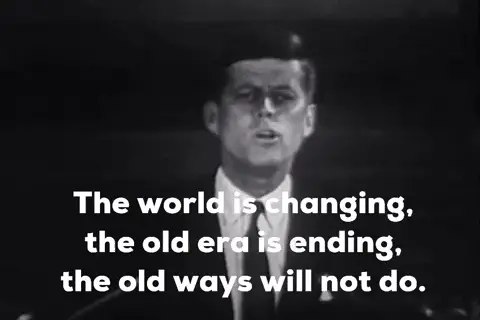
There is this one topic that tends to go unnoticed. It's even better described with phrases like "we're just like a family, so things can get rough" or "the tone is sometimes rougher in our industry." It's the organizational culture. This nasty little thing that simply exists, even though no one has ever asked about it - or perhaps because nobody has asked about it. The thing that can be observed every day and is somewhere implicitly anchored in the minds of all employees. On the one hand, this is a good thing: you, dear readers, don't have to pay anyone to build culture for you. You don't have to have a special Mindset on the day. You just have to accept that culture is one of the most important factors for a digital transformation.
But why is that?
Quite simply, when change takes place (e.g. a transformation), there is a very high probability that something will change in terms of collaboration, the skills required and also the company's target groups. Hoping that such a change can be mapped purely through new processes will prove to be very difficult. After all, regardless of how open and transparent your own communication is, you always have to pick people up from where they are. And the cherry on the cake is getting people somewhere.
Culture cannot be changed by a beautifully animated PowerPoint presentation. If we want to build a spaceship, we don't put the blueprint on the floor, switch the light off and on briefly and then look at the finished steel tube that catapults us out of Earth's orbit.

Ralph Cibis
Culture Lead @ Thomann.io
What does that mean in concrete terms?
A simple step in establishing a culture - as the past has shown us very well - is to speak a common language. It is also likely that this is already being done in your companies. Very good. But can this common language already describe where the transformation is going? Do all employees have the new - and necessary - vocabulary on their screens?
And that's not all: learning new words is one side of the coin, but understanding them, being able to use them and understanding why these words are important now is the other. The wishful thinking that this works via a beautifully animated PowerPoint presentation, even if it is sent again as a PDF after the presentation, is pretty naive. If we want to build a spaceship, we don't put the blueprint on the floor, switch the lights off and on briefly and then look at the finished steel tube that catapults us out of Earth's orbit. No. We may have given the go-ahead, but we still have a long way to go.
At this point, it would even be negligent to claim that we are talking about a transformation. By definition, that would presuppose that we know the end state . In a complex environment such as a culture, we should rather assume a transition, a constant change. Employees come and go, markets change, the conditions in society and life are probably different today than they were in (or 3-5 years ago). So the question arises: What does our desired end state look like? And I'll give you the answer right away: there won't be one.
So what can we do?
It all sounds a bit gloomy and looks as if organizational culture is an unconquerable mountain. But it is not. There are some effective levers that can be used to support the cultural change that takes place during a digital transformation.
- Create your own awareness of simple truths: Most people act to the best of their ability. If you encounter problems during your transformation, do not explain them with malice but with ignorance and use these situations once again as an opportunity to explain goals and strategies.
- Start where you are right now: Say goodbye to assumptions. Make communication explicit and transparent. Create formats in which you regularly remind your employees of your goal, make current progress visible and respond respectfully to questions and fears. Move away from "he/she still doesn't understand" to "we haven't explained it well enough yet." Learn from this. A short all-hands meeting, e.g. 45 minutes a month, can work wonders here. Regularity beats duration.
- Give your employees the amount of autonomy (i.e. the freedom and confidence to decide and implement things themselves) that they need for a successful transformation. As a rule of thumb, you can assume that it is always a little more than you think. But experience and empiricism have shown that self-organization and autonomy are the means of choice to solve problems in a changing world.
- Redefine the role of superiors. Move away from the idea of managing people. Focus on shaping and managing the system, i.e. the working environment. Set guidelines and let your employees do what they think is right. Learn from mistakes and reflect on new findings together.
- If something isn't broken, you don't have to fix it. Digital transformation is a huge topic. So focus your energy and that of your employees on the things that are really important right now. Optimize where it hurts. If you notice that a topic is being beaten about the bush or you feel uncomfortable asking a question, then this is the best indicator that you have found an important topic.
- Focus on collaboration, even between departments. Products, processes and systems are only as good as the communication between the people who design them. The better people know each other and work together, the better (and above all more efficient) the results will be.
What do we learn from this?
In the face of change, there is one constant: people. Be courageous and discard old beliefs. The road ahead will be paved with problems, mistakes and setbacks. But also of important insights and many learnings. You don't change culture overnight. Just like a business model. It is another dimension in the process of a successful digital transformation. So once again: nothing will change overnight. Work with reality and take small steps. An evolutionary process with room for exchange and reflection will help you to establish a lasting change in your company. Take the time to explain over and over again where the journey is going and what is important to you. Listen to your employees' questions and respond to them with goodwill and patience. This will also help you to establish new ideas and business models throughout the company.

In the end, we are back to simple truths. It is not complicated, but simple things can also be difficult. Rome was not built in a day and this fact also applies to your transformation.

About the author
Ralph Cibis
Ralph is Culture Lead at thomann.io GmbH, the technology and data department of Thomann Music. He sees himself as an organizational and cultural engineer whose areas of responsibility include organizational development, culture, people operations and team coaching. He also advises companies on topics such as leadership and agile working methods.
Thomann operates one of the largest e-commerce platforms for musical instruments, event and studio technology and is a classic hidden champion of the German SME sector.
About us:
MORGEN is a specialized management consultancy that focuses on the development of new business models for medium-sized companies. In particular, it supports owner-managed companies in their future-proof transformation. Knowledge transfer is at the heart of its consulting activities, which is why the MORGEN Blog regularly publishes articles on key topics such as digitalization, transformation, customer centricity and sustainability.

